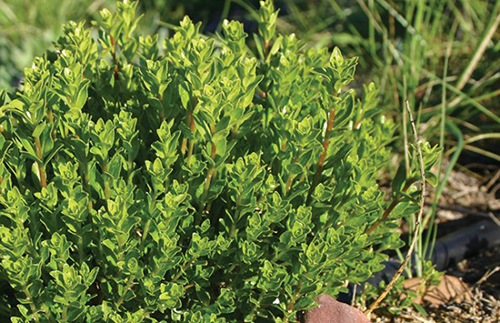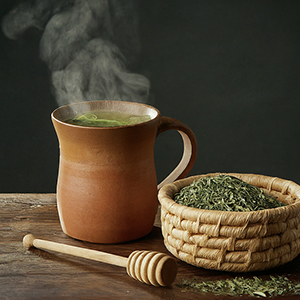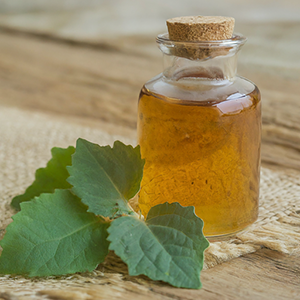Contents
The Hottentots of South Africa already knew about the benefits of buchu leaves before the arrival of the Europeans. Its excellent virtues in combating urinary organ inflammation have led it to spread worldwide. Today, many herbalists and phytotherapeutic preparations offer benefits to buchu leaves.

Buchu Leaves Scientific Facts
- Other names – Bucku.
- French – Buchu.
- Spanish – Buchu.
- Environment – Native to South Africa and grown in South America, this plant is known in Europe.
- Description—This shrub of the Rutaceae family can grow up to two meters high and has opposite, oval-shaped, slightly-haired leaves. The whole plant has an aroma resembling a mixture of peppermint and rosemary.
- Parts of the plant used medicinally – The leaves.
Healing Properties
The buchu leaves contain an essential oil (diospherol), its most crucial active component. It acts as:

- Diuretic.
- Urinary antiseptic.
- Genital and urinary organs are anti-inflammatory, especially urine, bladder, and prostate.
The buchu leaves and bearberry are among the most effective plants in successfully fighting inflammation diseases of the urinary organs. It is especially recommended in the following cases:
- Pyelonephritis (inflammation of the renal pelvis and kidneys).
- Cystitis (inflammation of the urinary bladder) alleviates the pain and burning felt when urinating with great success.
- Urethritis (inflammation of the urethra), whether or not it is caused by sexually transmitted germs (blennorrhagia). It regenerates the urinary mucosa and makes discomfort disappear. It is useful both taken in infusion and applied in urethral cleansing.
Buchu leaves are an excellent diuretic and are considered one of the best-known. This plant is used for catarrh of the bladder, cystitis, nephritis, chronic kidney and bladder disorders, including inflammation of the urethra. It is used chiefly for urine retention and bladder infections. It also can reduce inflammation of the colon, vagina, sinuses, prostate, gums, and mucus membranes. People with diabetes can also benefit from buchu leaves, especially in the first stages. Digestive disorders, prostate disorders, and fluid retention are also treated using this herb.

Like other diuretics, this herb works best as an excellent infusion. Buchu leaves are usually combined with uva ursi to treat urinary tract infections and water retention. It can also be utilized in fever treatments and venereal diseases. Some herbalists say replacing coffee with an after-dinner beverage is highly effective. Buchu leaves (two parts), uva ursi (two parts), orange peel (one part), peppermint (one part), chamomile (one part), and comfrey leaves (one part).
Use ¼ ounces of the herb mixture in a pint of hot water and let steep for ten minutes. This combination can strengthen the kidneys.
Note: Boiling buchu leaves or uva ursi is not recommended because their medicinal properties are volatile oils.
How to use Buchu Leaves
- Buchu tea
- Urethral washings with the same infusion are used internally for urethritis.
Infusion (tea): Let steep for five to fifteen minutes. Take three ounces three to four times daily (do not boil the leaves). Tincture: Take ½ teaspoon three times daily. Fluid Extract: Take ½ to one teaspoon three times daily. Powder: Take two to three #0 capsules (10 to 15 grains) thrice daily.
Other Baromosa Species
In southern Africa, there are other species of the Baromosa, other than buchu (Baromosa betulina), such as Baromosa crenulate (L.) Hook and Baromosa serratifolia (Curtis) Wild. These shrubs with a similar appearance are sometimes cultivated, and their leaves have the same medicinal properties.
DISCLAIMER: All content on this website is presented solely for educational and informational objectives. Do not rely on the information provided as a replacement for advice, diagnosis, or treatment from a qualified medical expert. If you are pregnant, nursing, or have any preexisting medical concerns, talk to your doctor before using any herbal or natural medicines.
REFERENCES
- George D. Pamplona-Roger, M.D. “Encyclopedia of Medicinal Plants.” George D. Pamplona-Roger, M.D. Encyclopedia of Medicinal Plants. Ed. Francesc X. Gelabert. vols. 2 San Fernando de Henares: Editorial Safeliz, 2000. 567. Print.
- Vance Ferrell Harold M. Cherne, M.D. The Natural Remedies Encyclopedia [Book]. – Altamont, TN: Harvestime Books, 2010. – Vol. Seventh Edition: 7: pp. 147.
- https://www.ncbi.nlm.nih.gov/pmc/articles/PMC5074784/
